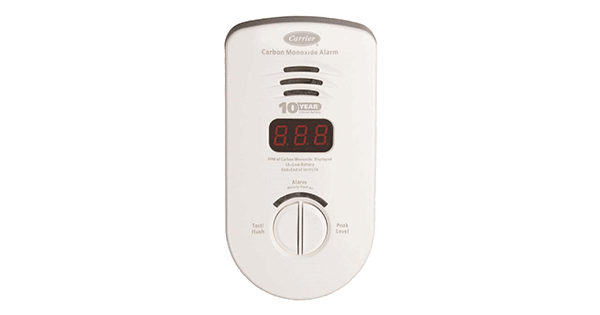HVAC Education, Indoor Air Quality, Carbon Monoxide Detectors
What To Do If My Carbon Monoxide Alarm Goes Off
If your carbon monoxide alarm goes off, it’s important to take immediate action to ensure your safety. In this guide, we'll discuss the sound of a carbon monoxide alarm and the five steps to take if your CO alarm is indicating dangerous levels of carbon monoxide in your home.
Why Is My Carbon Monoxide Detector Beeping?
A carbon monoxide detector beeping typically indicates the presence of carbon monoxide, requiring immediate attention and evacuation, or it could signal a low battery or end-of-life warning. Check the detector’s manual to understand the specific beeping pattern, and if it's a carbon monoxide alert, evacuate and call emergency services immediately.
What Does A Carbon Monoxide Alarm Sound Like?
How do you know what you're hearing is a carbon monoxide alert? A carbon monoxide alarm emits a loud, continuous, beeping sound that is designed to alert you to the presence of carbon monoxide gas in your home. The beeps are typically short, high-pitched, and repeated in a pattern, such as four quick beeps followed by a pause, then repeating. This distinctive sound is meant to grab attention, even during sleep, to ensure you can evacuate the area immediately. It’s crucial to differentiate this sound from the low-battery chirp, which is usually a single beep at longer intervals.
Does A Carbon Monoxide Detector Go Off Continuously?
Yes, a carbon monoxide (CO) detector will sound continuously when it detects dangerous levels of carbon monoxide in your home. The alarm typically emits a series of loud, high-pitched beeps in a repeated pattern until the CO levels drop or the detector is reset. The continuous beeping is designed to grab attention and alert occupants to the immediate danger so they can evacuate.
What Should I Do If My Carbon Monoxide Detector Goes Off?
- Do not ignore the alarm. Assume it is working properly and there are unsafe levels of carbon monoxide in your home.
- All people and pets should quickly evacuate the home and find fresh air.
- Call 911 immediately and report that the alarm has gone off.
- Do not assume it is safe to reenter the home when the alarm stops. When you open windows and doors, it helps diminish the amount of carbon monoxide in the air, but the source may still be producing the gas. The levels can build up again once you go back inside and close the windows.
- Have the emergency responders check for the source of carbon monoxide and determine if it is safe for you to return to your home.
My Carbon Monoxide Detector Went Off Then Stopped: What Do I Do?
If your carbon monoxide detector went off and then stopped, it's important to take the situation seriously, even if the alarm is no longer sounding. Even if the alarm has stopped, get everyone out of the home to a place with fresh air. Contact 911 or your local fire department to report the incident. They can come to your home with equipment to measure CO levels and ensure it is safe to re-enter.
How To Turn Off Carbon Monoxide Alarm
Most CO detectors have a "silence" or "reset" button that will temporarily stop the alarm. Locate this button (usually on the front or side of the unit) and press it according to the manufacturer’s instructions. This may silence the alarm for a brief period, but it will reactivate if CO levels remain high. If it is safe to do so and the detector is battery-operated, you can remove the batteries to stop the alarm temporarily. For hardwired models, you may need to unplug the unit. However, this should only be done if you are sure there is no ongoing CO danger. Some alarms will sound due to low batteries or a malfunction, rather than the detection of carbon monoxide. Refer to the user manual for your detector to see if any error codes or indicator lights provide more information about the reason for the alarm. If the alarm continues to go off without any apparent carbon monoxide threat, it may be faulty or reaching the end of its lifespan (often 5-7 years). In this case, replacing the unit is important to ensure ongoing safety.
What Are the Symptoms of Carbon Monoxide Exposure?
Some symptoms could include:
- Headache
- Dizziness
- Fatigue or weakness
- Nausea
- Vomiting
- Loss of consciousness
- Light-headedness
- Blurred vision
- Sleepiness
- Loss of muscle control
- Increased heart rate
- Tightening in the chest
- Confusion and disorientation
Put Carrier Comfort in Your Home


